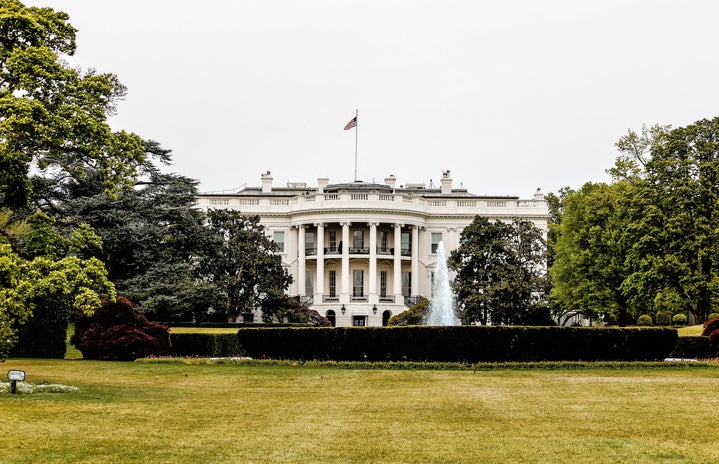It’s 2005. The pink fuzzy alarm clock reads 4:03 a.m. and the scene is lit accordingly. She wears a deep red skirt suit. She climbs into bed with Rory Gilmore. The lines are what Lorelai Gilmore would say, yet she’s playing herself.
“This time, many moons ago, I was lying in exactly the same position here, only I had a fat stomach and huge ankles and I was swearing like a sailor,” Albright delivers the line in all seriousness. She maintains perfect comedic timing while being self-aware of how bizarre this dream scene truly is.
This was one of Madeleine Albright’s many starring roles, as her superstar foreign policy career warranted no introduction, including her season six cameo in Gilmore Girls. The audience would know who she is. From Holocaust survivor to child refugee, to college student to wife, from middle-aged divorcee to first female Secretary of State, Madeleine was at the top of her game, and a force to be reckoned with.
Albright, originally named Marie Jana Korbel, was born in Prague in 1937 where she lived for the first two years of her life. Her family fled to England in 1939 after the Nazis invaded Czechoslovakia during World War II. She would learn much later in life, that during this time, her parents converted to Catholicism from Judaism to avoid persecution. Additionally, during the Holocaust, 26 relatives, including three of her grandparents, died in concentration camps.
After the war, Madeleine’s family returned to Czechoslovakia for a brief time before the resurgence of Cold War communism spread through the country. Because of the pervasiveness of communism in Czech schools, Madeleine was sent to a boarding school in Switzerland at 10-years-old to learn French. Eventually, the Korbel family left Czechoslovakia for Denver, Colorado, where she arrived as a refugee at the mere age of 11-years-old.
She writes in her memoir, Madam Secretary, about the 1948 voyage, “Our ship passed through a November sea. The winds were strong and the waves high. Enormous black clouds gathered overhead, bringing pelting rain and freezing cold.”
She explained, “I thought the trip I had anticipated so much would never end. Only when we neared our destination did the skies clear. Finally, on November 11, 1948, Armistice Day, we steamed into New York Harbor. There was the Statue of Liberty. Holding my sister’s hand, I stared in awe at the welcoming figure.”
She later stated that she dropped her British accent when arriving in the U.S. as she wanted to acclimate herself as much as possible. Although she truly was a citizen of the world, she eventually became a U.S. citizen in 1957. Her father worked as a professor at the University of Denver, which is likely how Madeleine became acquainted with world affairs at a young age.
Madeleine’s love of journalism and politics flourished as she attended Wellesley College, where she worked for the school newspaper until she graduated in 1959. She later received her master’s and Ph.D. from Columbia University, studying public law and government. In between summers of her university degree, she interned at the Denver Post, where she met and fell in love with Joseph Albright, a fellow intern, newspaper dynasty heir, and future journalist. They married in 1959 and had three children, although their marriage turbulently ended when Joseph left her for another woman. He struggled with the decision and said that he would base the decision on the Pulitzer Prize. If he won, he would stay with Madeleine. If he lost, he would leave her for the younger woman. Madeleine and Joseph divorced in 1983 after he lost the prize.
Albright established herself in the political sphere in 1972 when she became a legislative assistant to Senator Edmund Muskie. Eventually, she was hired in 1976 to work for President Jimmy Carter, her first time in a presidential administration. Through the 80s, she followed in her father’s footsteps and worked as an international affairs professor at Georgetown University. She rose to the political spotlight when President Clinton appointed her as Chief Delegate to the United Nations in 1993.
Despite being a foreign policy expert, doubtful reporters would call her, “Madeleine Half-Bright” as she dealt with the Somali Civil War, Bosnian War and genocide in Rwanda. Her experience and successes landed her the role as first female Secretary of State under President Clinton during his second term. About her career, she later remarked to New York Magazine, “I’ve said this many times — there’s plenty of room in the world for mediocre men, but there is no room for mediocre women. You have to work. You have to work exceptionally hard, and you have to know what you’re talking about.”
Upon her appointment as the 64th Secretary of State, she announced, “As a secretary, I will do my best to talk about foreign policy, not in abstract terms, but in human terms and bipartisan terms,” the New York Times wrote. “I consider this vital because, in our democracy, we cannot pursue policies abroad that are not understood and supported here at home.”
At the time, she was the highest-ranking woman in the United States, paving the way for other elected women to rise to high offices, such as Secretary of State Condoleezza Rice in 2005, Secretary of State Hillary Clinton in 2009, Speaker of the House Nancy Pelosi in 2007 and Vice President Kamala Harris in 2021. During her time as Secretary of State, Albright worked to expand NATO and served during the War in Iraq. Her performance was well-received among civilian Americans and foreign diplomats. Former President Bill Clinton stated that she was perfect for the time because her family’s experience drove her to become a champion of human rights. She served from 1997 to 2001, and soon after her term, she began writing autobiographical books about her life. Her achievements landed her the Presidential Medal of Freedom, which President Obama awarded her in 2012. She strongly championed other women in politics, such as her endorsement of Hillary Clinton in 2016, when she told a New Hampshire primary crowd that “there’s a special place in hell for women who don’t help each other!”
Seemingly, the only thing that could take down this trailblazer was cancer, as she passed this last Wednesday. Madeleine was 84 years old. She was a mother, grandmother, aunt and sister. She loved pins that would coyly express her diplomatic opinions, from an eagle pin when she was sworn in, to a snake pin for a meeting in Iraq. In her retirement, Albright took up drumming and performed in a 2012 Chris Botti Concert. In addition to Gilmore Girls, she made appearances as herself on Parks and Recreation in 2015 and Madame Secretary in 2018. She never married again and was wary of dating. She joked, “I can’t go out with a Republican.”
From her birth during the rise of Nazism to her death in an ending pandemic, Madeleine stood the test of changing times. Former President Bill Clinton told CBS News, that even in the weeks of her declining health, she worried about the situation in Ukraine, and it was “like a replay of a bad movie for her.”
Even as her health worsened, her concern was centered on the world she would leave for her grandchildren. Her passion for human rights skyrocketed her above the deep sexism that was a long-running tradition in the White House and governmental spaces abroad. She tried to make a difference until the very end. Above all, she represented the true power and exceptionalism of the American woman.
Want to see more HCFSU? Be sure to like us on Facebook and follow us on Instagram, Twitter, TikTok, YouTube and Pinterest!


